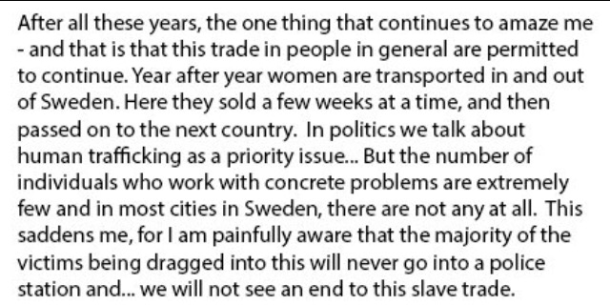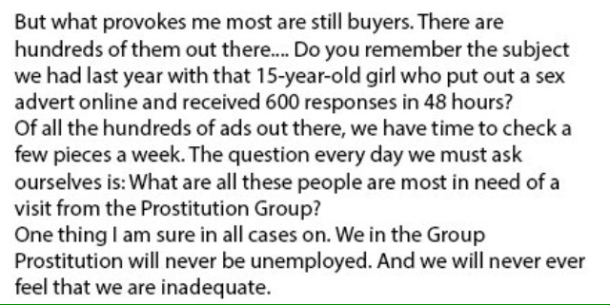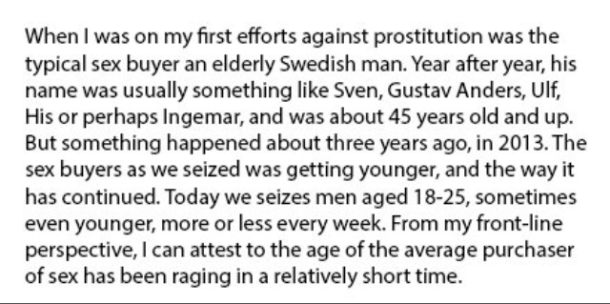Last week, at its AGM, the member groups of the National Women’s Council of Ireland voted down a motion (proposed by the Abortion Rights Campaign and seconded by the Migrant Rights Centre Ireland) calling on the NWCI to “develop a process for a review of its position in relation to prostitution and sex work”. Instead the NWCI reaffirmed its existing position, supporting the Swedish model and defining all prostitution as violence against women.
The committee in charge of these things decided that you could only support one motion or the other, and the latter motion (proposed by Ruhama and seconded by the Irish Nurses & Midwives Organisation) won out by 43-24. Reports from attendees suggest that there would have been more support for the ARC motion if it hadn’t been deemed oppositional to Ruhama’s.
The outcome was disappointing but not surprising, particularly in light of the fact that sex workers themselves were unable to contribute to the debate. This is because the only Irish organisation led by current sex workers, the Sex Workers Alliance Ireland, has been refused membership of the NWCI. The NWCI is therefore taking policy positions about a group of women without allowing those women any say in the position it takes.
The criteria for joining the NWCI are listed on its website. While I don’t have access to the written reasons for refusal, I understand its Board decided that SWAI didn’t agree with the NWCI’s “values”. It should be noted that the Board includes Sarah Benson, CEO of Ruhama, and Sheila Dickson, a past president of the INMO.
Now obviously the NWCI is a private organisation (albeit one that receives a fuckton of public money) and has a right to decide who can join it. But it seems … curious that this issue is one that they’re prepared to exclude a group over. You would think, for example, that repealing the 8th amendment would be regarded as a key NWCI value (especially given the organisation’s effective takeover of the Repeal, sorry the “Yes” campaign) and yet it was fine for member groups to refuse to support it, like Ruhama and the YWCA. Equal rights for same-sex couples might also be thought of as a key NWCI value, yet it has no problem with the membership of an organisation that “continues to hold the view that ‘marriage’ is inherently between a man and a woman”. Not locking young women up in institutions for perceived moral failures, where they would be forced to work as slaves, should pretty definitely be a key NWCI value and yet a group whose founders did exactly that, and which still has board members who are refusing to pay redress to these women, are not only allowed to be members but are effectively allowed to direct the organisation’s policy towards the “fallen women” of today. Their attitude towards groups that don’t share their “values” seems a little bit selective.
But I think it’s important to point out that simply opposing the NWCI stance on sex work isn’t enough to make a group unwelcome in the NWCI. If it was, then ARC and the MRCI and all the others in the 24 would presumably be tearing up their membership cards. So, it’s fine for a women’s group to advocate for the rights of sex workers as long as they aren’t sex workers themselves. It isn’t about values at all, then; going on that vote, SWAI’s values are shared by more than a third of NWCI member groups already. What is it then? Are sex workers the NWCI equivalent of “Unwomen”? Do they have cooties? Or does the Board just not want to have to listen to them?
The most galling thing about the Ruhama motion is that it refers to “support for women and girls affected by prostitution and sex trafficking“. But what constitutes “support” is being decided in a context where the affected girls and women are denied a voice. Supporters of the policy would no doubt argue that the women they’re concerned with are a different class of sex worker to those in SWAI, but they have nothing to support the implicit suggestion that those women want their clients criminalised. It’s notable that GOSHH (Gender, Orientation, Sexual Health, HIV) and the Chrysalis Community Drug Project, the two other Irish organisations that do outreach to the more vulnerable sectors of the sex industry, are both strongly opposed to the Swedish model.
There are, of course, former sex workers (or survivors, to use their preferred terminology) who would share the NWCI’s position. But isn’t it remarkable that practically none of them seem to have actually worked in Sweden – or any other “Nordic model” country – under that law? We’re nearly 20 years into it now; if it worked as well as its advocates say it does you’d expect there would be dozens if not hundreds of women coming forward to share their accounts of how the Swedish model saved them from the sex trade, but I legitimately cannot think of one. Certainly, all the survivor organisations are led by women who didn’t survive the law that they’re campaigning for. Nor, it seems, are they particularly interested in hearing from women who did: whenever I’ve mentioned them in response to “listen to survivors” comments, the response has been … crickets.
Yes, especially survivors of the Nordic Model which WEP are pushing.
— Wendy Lyon 🐾 (@wendylyon) May 28, 2018
And there’s also research from nearly every country where the law has been introduced, showing that opposition to the law straddles all classes of sex worker. I’m not going to link to it all here because frankly it’s tiring always pointing to research that Swedish model advocates just ignore anyway. Though tellingly, they can’t provide any research that says the opposite.
At the very least, though, a member-based organisation like the NWCI ought to be listening to groups of women before taking policy positions about their lives. This is one of those things that I can’t believe I even have to say. The refusal to do so sends a clear message that it simply isn’t interested in what sex workers think. Its position on this issue is going to be determined by the organisation’s own take on “feminist values”, one of which is apparently not recognition of lived experience. I could dig up loads of NWCI quotes from the Repeal campaign which show the irony of this approach, but I understand Linda Kavanagh from ARC already made that point at the AGM and it clearly didn’t make a difference. The NWCI doesn’t “trust women” who are sex workers, doesn’t want to hear from them, will happily let others speak for them (or purport to), but ultimately will fall back on the conviction that it knows what’s best for them, anyway. Viewed in that light, maybe its embrace of an NGO with roots in the Magdalene laundries shouldn’t be so much of a surprise.

























